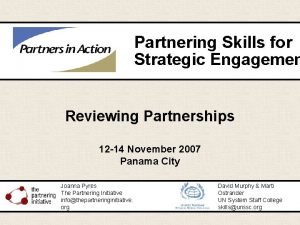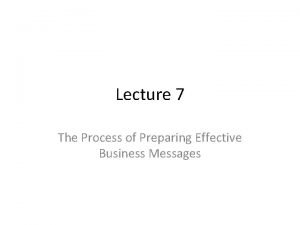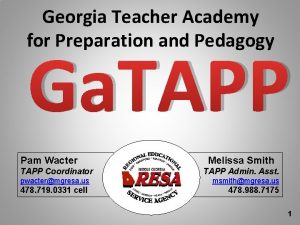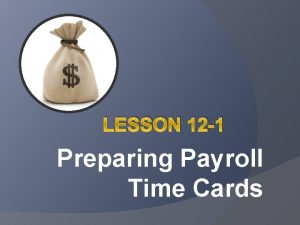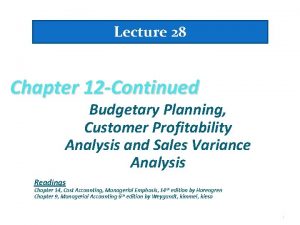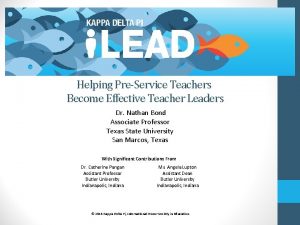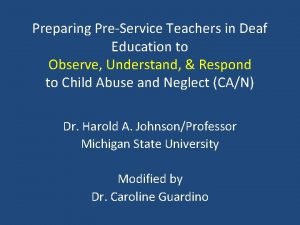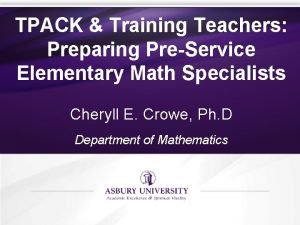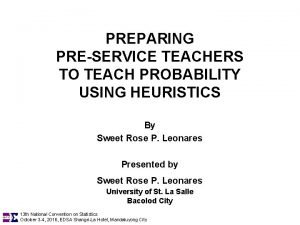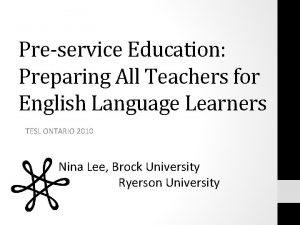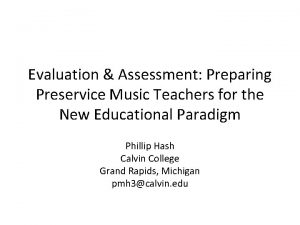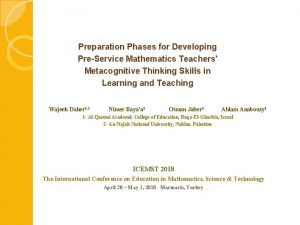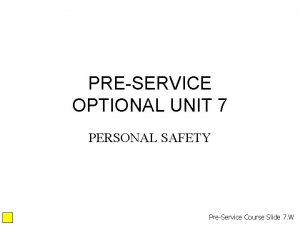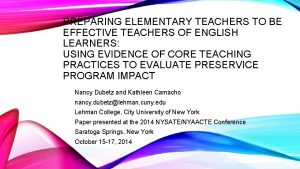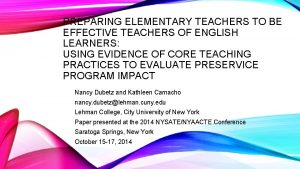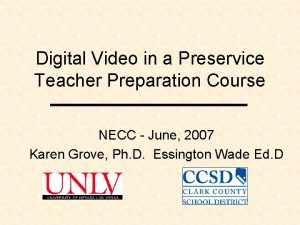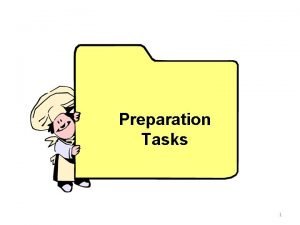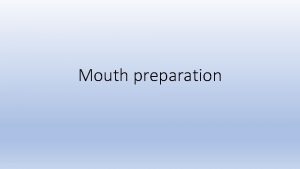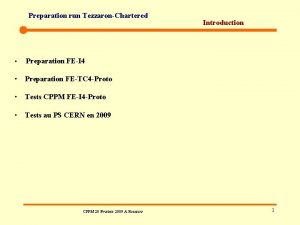Partnering in PreService Teacher Preparation Preparing effective teachers




























- Slides: 28

Partnering in Pre-Service Teacher Preparation Preparing effective teachers for all students Lori Johnson L 4 L 5 COI 2015

Elementary students K-6, at-risk, low-achieving “Well, they … have an IEP are ELLs live in poverty suffered trauma …so that’s why they are low. ”

We are called to prepare Educators of Mind and Heart – who demonstrate a sincere and equitable commitment to the success of all, paying attention to the role that diversity, including gender, abilities, ethnicity, race, religion or socio-economic status bring to the learning and the community.

Equity and Excellence Key Questions Are K-6 students from low SES receiving instruction that meets their needs for literacy learning? Are K-6 pre-service teachers developing their gap closing literacy strategies? Are we, as leaders, designing a system that supports preservice teachers to teach all students, specifically students whose SES, culture, or language, differs from their own?

Student Problem of Practice K-6 Students considered low SES, or qualify for IEP or ELL support are scoring at lower levels in reading than their middle and high SES counter parts.

Evidence Grade level # of students Meeting School SES 1 st grade 24 3 44. 7% 2 nd grade 24 10 70. 5% 3 rd grade 24 15 55. 1% 4 th grade 29 26 29. 4% 5 th grade 24 4 89. 3% 6 th grade 17 6 89. 3% Consistent with National Assessment of Educational Progress

Teacher Problem of Practice • Most TCs demonstrate a beginning awareness of the causes for the gap in achievement and inconsistently use equitable teaching strategies to eliminate disparities in student learning.

Students not at standard 3 rd grade 1 student* not at standard “If that student had involved parents, he would meet standard. ”

Leader Problem of Practice We have inconsistent expectations for inclusion of gap closing strategies in course work. We are minimally providing strategies, support, and examples of two-way ongoing communication with families.

Evidence v. Course expectations (syllabi) ved. TPA v. Signature assessments that address cultural competence and differentiation

Data Elementary student formal and informal reading assessments Teacher Candidate work, deficit based assumptions/comments in class & reflections Assignments, syllabi, lesson/agenda

A Theory of System-Focused Action If teacher prep leaders design a system that supports pre-service teachers to effectively teach all students, specifically students whose SES, culture, or language, differs from their own… Then K-6 teachers will recognize their biases, develop and use gap closing literacy strategies, connect with families, and have high expectations to improve their instruction… And K-6 students who receive support based on SES, ELL, or IEPs will receive instruction that meets their needs for literacy learning; believing and achieving to high standards.

Data Collection & Use Names of students Class Deficit based comment teacher roles Class Deficit based comment parent roles Reflection Deficit based comment teacher roles Reflection Deficit based comment parent roles JA ll l IJ l l MH ll BL l KM l EC l l

Causality • Minor focus on strategies for partnering with families in their child’s education (faculty, supervisors) • School placement of TCs (mentors, administrators, school culture) • Subtle and overt comments that place blame and reinforce deficit thinking

Collecting and Using Evidence Qualitative Data • TCs reflections/comments • Lesson plans with Culturally Responsive Teaching Strategies & Differentiation • Lesson agendas – courageous conversations • Survey from TCs on place based literacy work • Syllabi • Benchmarks

Quantitative Data • Number of deficit based comments in class • Number of deficit based comments in weekly reflections • Scores on • Reading levels of 2 nd&4 th graders • Reading levels of K-6 students* • Interactions with families* *=data collected by TCs

Action • • Fall 2014 two classes off site Using data to guide instruction Asking questions Taking a teaching and learning stance People 1 st language Courageous Conversations Differentiation

Constraints & Challenges • • # of teachers with diverse backgrounds time with my TCs # of mentors, schools, districts 1 year long placement

The span Talk Performance

What Happened 36 - 2 nd and 4 th grade elementary students assessed and served for fluency and comprehension growth 100% showed an increase in fluency and comprehension

What Happened 21 Whitworth University students assessed for: literacy vocabulary, understanding and use of assessments in teaching and learning, and literacy teaching strategies 100% showed an increase in all three areas

What Happened 2 first year elementary teachers helped with data and strategies for teaching fluency, vocab, and comprehension

What Happened • Impact of expectations Increased awareness of biases • Increased use of people first language • Increase in taking a learning stance • An awareness of the need to shift from schools as social saviors to addressing poverty

Actions Not Taken/No Data • What is the impact of TCs on their students’ literacy learning? • Efficacy of K-6 students • Spring Data

Next Steps: • Shadow student(s) in literacy • Instructional Support for TCs • After-school support in Literacy for school with students that show highest need • Connect with high-performing teacher prep programs that prepare effective teachers for challenging schools • Identify resources for bias training • Identify resources for family engagement • Growth mindset

• “Always assuming the best. Lori, I suppose this one is for you--I see you practice it so often. I am concerned with parents blowing off meetings/conferences without acknowledging their choices. It seems so disrespectful to no call/no show. What can I do? ”

“Your present circumstances don't determine where you can go; they merely determine where you start. " -- Nido Qubein

References
 Lorna maden
Lorna maden Partnering to build customer relationships
Partnering to build customer relationships What is partnering
What is partnering The partnering initiative
The partnering initiative Partnering session
Partnering session Mnos partnering
Mnos partnering Process of preparing effective business message
Process of preparing effective business message Kim kroll
Kim kroll Seven habits of highly effective teachers
Seven habits of highly effective teachers Facilitator style teaching
Facilitator style teaching Teachers and teacher aides working together
Teachers and teacher aides working together Teachers and teacher aides working together
Teachers and teacher aides working together Teachers and teacher aides working together
Teachers and teacher aides working together Difference
Difference Outcome based assessment in ecd
Outcome based assessment in ecd Georgia teacher academy for preparation and pedagogy
Georgia teacher academy for preparation and pedagogy Erf in deped
Erf in deped Teacher
Teacher Primary cooking equipment meaning
Primary cooking equipment meaning Preparing haloalkanes from alcohols
Preparing haloalkanes from alcohols An art and science of preparing
An art and science of preparing Mise en place sandwiches
Mise en place sandwiches Study guide 12 part two analyzing payroll procedures
Study guide 12 part two analyzing payroll procedures Chapter 15 preparing for careers
Chapter 15 preparing for careers Ready set go
Ready set go Culinary preparations meaning
Culinary preparations meaning Preparatory empathy
Preparatory empathy Soriano company is preparing its master
Soriano company is preparing its master Providing valet services
Providing valet services



